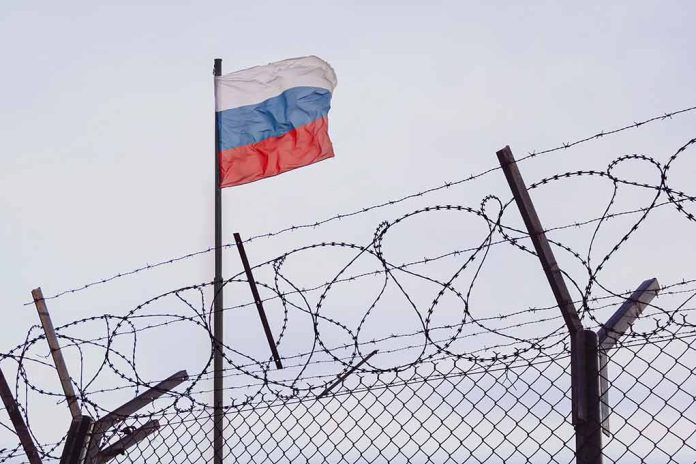
Russia silences global human rights watchdog Amnesty International, adding it to a growing blacklist of “undesirable organizations” as Putin’s regime intensifies its crackdown on dissent amid the Ukraine conflict.
Key Takeaways
- Russian authorities have officially banned Amnesty International, labeling it an “undesirable organization,” making any association with the group a criminal offense
- Moscow claims the human rights organization promotes “Russophobia” and supports Ukrainian “neo-Nazis,” consistent with Russia’s war propaganda narratives
- This ban is part of a broader crackdown on critics, journalists, and activists that has intensified since Russia’s invasion of Ukraine in February 2022
- Anyone cooperating with “undesirable” organizations in Russia now faces potential fines or imprisonment under a 2015 law
Human Rights Under Attack in Russia
In a significant escalation of President Vladimir Putin’s war against international oversight, Russian authorities have formally banned Amnesty International, one of the world’s most prominent human rights organizations. The Russian Prosecutor General’s office announced the decision through an online statement, effectively criminalizing any association with the London-based group. This move represents yet another step in Russia’s systematic dismantling of civil society and rejection of outside scrutiny as the Ukraine conflict continues under President Trump’s watch.
“RUSSIAN AUTHORITIES HAVE OUTLAWED AMNESTY INTERNATIONAL AS AN ‘UNDESIRABLE ORGANIZATION,’ A LABEL THAT UNDER A 2015 LAW MAKES INVOLVEMENT WITH SUCH ORGANIZATIONS A CRIMINAL OFFENSE,” stated the Russian Prosecutor General’s office.
The 2015 law that Russia is using against Amnesty International has already been weaponized against dozens of foreign organizations and media outlets. Anyone found working with or supporting such “undesirable” entities faces potential criminal prosecution, with penalties ranging from heavy fines to years of imprisonment. This legal mechanism has proven effective at silencing external voices that might criticize the Kremlin’s policies, particularly as they relate to the ongoing conflict in Ukraine.
Russia’s Accusations Against Amnesty
The Russian government’s justification for banning Amnesty International reveals the deeply paranoid worldview driving Putin’s policies. Russian authorities have characterized the human rights organization as a hub of anti-Russian sentiment, claiming it deliberately promotes hostility toward Russia and supports Ukraine in ways that undermine Russian interests. These accusations align with the Kremlin’s broader narrative that portrays Russia as a victim of Western aggression rather than the aggressor in Ukraine.
“Russia’s Prosecutor General accused the London-headquartered body of being a “centre for the preparation of global Russophobic projects, paid for by accomplices of the Kyiv regime,” said Russia’s Prosecutor General.
Moscow’s rhetoric about “de-Nazifying” Ukraine has been consistently rejected by President Zelenskyy, Western nations, and independent experts as transparent propaganda designed to justify Russia’s territorial ambitions. Amnesty International has directly challenged these narratives by describing Russia’s military actions in Ukraine as a “war of aggression,” language that directly contradicts the Kremlin’s preferred framing of the conflict. The organization’s refusal to adopt Russian terminology has clearly contributed to its being targeted.
Broader Crackdown on Civil Liberties
The ban on Amnesty International is not occurring in isolation. It represents just one component of a comprehensive campaign to eliminate independent voices within Russia. Since the invasion of Ukraine began in February 2022, the Russian government has dramatically accelerated its suppression of journalists, activists, and organizations that challenge official narratives. Thousands have been arrested for anti-war protests, independent media have been effectively eliminated, and foreign news sources have been blocked.
“The rights to freedom of expression, peaceful assembly and association remained severely restricted,” it adds, detailing “arbitrary persecution” of religious groups, children and LGBTQ groups, among others,” stated Amnesty.
Amnesty International’s own reporting on Russia had highlighted the country’s systematic dismantling of basic freedoms, documenting how dissenters face arbitrary prosecutions, unfair trials, and lengthy prison terms under laws that fail to meet international human rights standards. The organization’s documentation of these abuses likely contributed to Russia’s decision to ban it entirely, as the Kremlin increasingly refuses to tolerate any form of criticism or accountability. With this ban, Russia eliminates yet another witness to its deteriorating human rights record.






